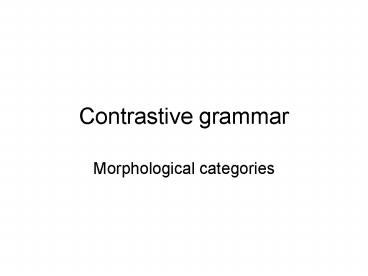Contrastive grammar PowerPoint PPT Presentation
1 / 29
Title: Contrastive grammar
1
Contrastive grammar
- Morphological categories
2
Category
- A class of items that have the same function
- a class of items that occur in identical
environment
3
Categories
- phonological
- phonemes and their classes
- grammatical
- lexical
- syntactic
- semantic
4
Grammatical classes
- A grammatical category
- a set of syntactic features that
- express meanings from the same conceptual domain
- occur in contrast to each other, and
- are typically expressed in the same fashion
- Parts of speech (noun, verb) are typically
grammatical classes - words that share the same features
5
Category
- A grammatical category is
- a linguistic category, not
- a real world category.
- the relationship between
- a linguistic category such as TENSE
- and a real world category such as TIME
6
Morphological category
- A grammatical category expressed by means of
- morphology
- Morphology
- deals with morphemes
- the minimal units of linguistic form and meaning,
- and how they make up units of language.
7
types of morphemes
- free part
- free morphemes can occur as separate words
- dog
- walk
- berry
- yes
- bound ing
- bound morphemes cannot occur on their own as
full words - -s in dogs
- de- in detoxify
- -ness in happiness
- cran- in cranberry
8
Types of morphological processes
- derivation/inflection
- inflection
- bound (grammatical) morphemes with free
morphemes, - do not produce new lexical items
- categorially productive
- derivation
- bound (lexical) morphemes with free morphemes
- new lexical items
- idiosyncratic
9
Inflection
- Does not change basic meaning or part of speech,
- big, bigg-er, bigg-est are all adjectives.
- Expresses
- grammatical features or
- indicate relations between words in the sentence.
- The girl loves the boy.
- Is categorially productive.
- combine with all members of a large category,
- with predictable effects on usage/meaning.
- Occur after (outside) any morphemes.
- ration-al-iz-ation-s the final -s is inflectional
- Predominantly suffixes only.
10
Inflection
- inflectional morphology is usually entirely
productive
11
Inflection productivity
12
Nouns
- Number
- Singular, Dual, Plural
- Grammatical gender
- natural grammatical
- Masculine, Feminine, Neuter (Animate, Vegetable)
- Definiteness
- Definite, Indefinite
- Possession
- 1st, 2nd, 3rd Singular Plural
- some languages mark this with possessive
pronouns my/mine, your/yours, his, her/hers,
its, - Case paradigm
- declension
13
Adjectives
- Degree
- Comparative and Superlative
- Number
- Singular, Dual, Plural
- Grammatical gender
- Case paradigm
- declension
14
Verbs
- Number
- Singular, Dual, Plural
- Grammatical gender
- natural grammatical
- Masculine, Feminine, Neuter (Animate, Vegetable
- Aspect
- Perfective, Imperfective
- Tense
- Past, Present, Future
15
Verbs
- Voice
- Active, Passive
- Mood
- Indicative, Imperative, Subjunctive
- Conjugation
- Types
16
Polish morphological categories
- From a Polish corpus
- relevant to segments (words) not to sequences of
segments (phrases) - tense, mood and voice is a property of phrases
17
Polish morphological categories
- Number (2 values)
- singular sg oko
- plural pl oczy
18
Polish categories Case (7 values)
- nominative nom
- woda
- genitive gen
- wody
- dative dat
- wodzie
- accusative acc
- wode
- instrumental inst
- woda
- locative loc
- wodzie
- vocative voc
- wodo
19
Polish categories
- Gender (5 values)
- human masculine (virile) m1
- papiez, kto, wujostwo
- animate masculine m2
- baranek, walc, babsztyl
- inanimate masculine m3
- stól
- feminine f
- stula
- neuter n
- dziecko, okno, co, skrzypce, spodnie
20
5 Genders??
- Diagnostic contexts
- Widze jednego _________ z tych, których lubie.
m1 - Widze jednego _________ z tych, które lubie. m2
- Widze jeden __________ m3
- Widze jedno ___________ n
- Widze jedna ___________ f
21
Polish categories
- Person (3 values)
- first pri
- bredza, my
- second sec
- bredzisz, wy
- third ter
- bredzi, oni
22
Polish categories
- Degree (3 values)
- positive pos
- cudny
- comparative comp
- cudniejszy
- superlative sup
- najcudniejszy
- Aspect (2 values)
- imperfective imperf
- isc
- perfective perf
- zajsc
23
Polish categories
- Negation (2 values)
- affirmative a
- pisanie, czytanego
- negative neg
- niepisanie, nieczytanego
- Accentability (2 values)
- accented (strong) akc
- jego, niego, tobie
- non-accented (weak) nakc
- go, -n, ci
24
Polish categories
- Post-prepositionality (2 values)
- post-prepositional praep
- niego, -n
- non-post-prepositional npraep
- jego, go
- Accommodability (2 values)
- agreeing congr
- dwaj, piecioma
- governing rec
- dwóch, dwu, pieciorgiem
25
Polish categories
- Agglutination (2 values)
- non-agglutinative nagl
- niósl
- agglutinative agl
- niosl-
- Vocalicity (2 values)
- vocalic wok
- -em
- non-vocalic nwok
- -m
26
(No Transcript)
27
(No Transcript)
28
Polish lexemes
29
English lexemes

